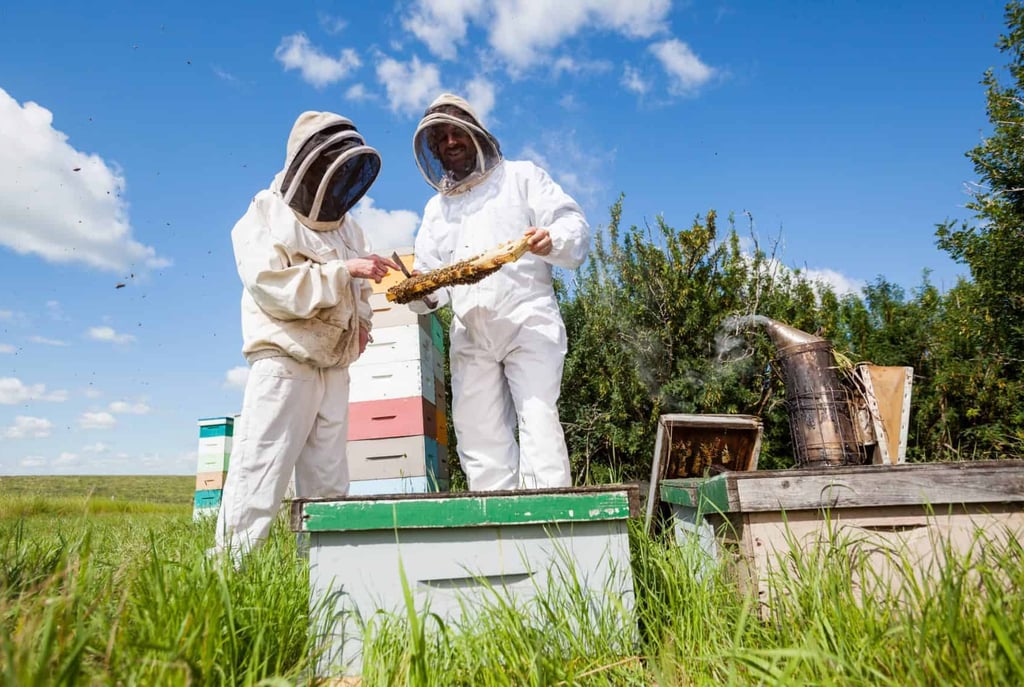Sustainable Beekeeping: Balancing Productivity with Planetary Health
In an era of climate instability, biodiversity loss, and agricultural strain, beekeeping stands at a pivotal crossroads.


In an era of climate instability, biodiversity loss, and agricultural strain, beekeeping stands at a pivotal crossroads. Bees are not just honey producers—they are essential pollinators and key indicators of ecological balance. For centuries, humans have relied on the resilience and utility of bee colonies, but now, the sustainability of this partnership is more important than ever.
This blog explores how beekeeping can serve both productivity and planetary health. We’ll examine sustainable hive management, eco-friendly material sourcing, low-impact manufacturing, and how companies like Heliotrope Bee, the world’s largest manufacturer and supplier of beekeeping supplies, are redefining how beekeeping and environmental stewardship can coexist.
1. The Ecological Role of Bees: Pollination as a Planetary Service
Bees pollinate more than 70% of global food crops. Apples, almonds, blueberries, melons, cucumbers, and countless other plants rely on their efficiency. A single honeybee colony can pollinate 250 million flowers per day under optimal conditions. Without bees, global food production would face severe disruption.
Sustainable beekeeping supports biodiversity by encouraging native plant growth, supporting wild pollinators, and maintaining healthy soil ecology. The practice isn't merely an agricultural activity—it's a cornerstone of ecological preservation.
2. The Threat Landscape: Why Sustainable Practices Matter
Modern threats to bee health include:
Pesticide exposure (especially neonicotinoids)
Habitat loss
Climate change
Invasive species (like the Varroa destructor mite)
Monoculture agriculture that limits forage variety
These stressors reduce colony resilience, lower pollination quality, and increase mortality rates. Unsustainable practices like overharvesting honey or relying solely on chemical interventions exacerbate the crisis. Thus, sustainable solutions must be embedded into every aspect of the beekeeping supply chain.
3. Hive Management for Sustainability
Adopting sustainable hive practices starts with understanding colony dynamics and working with bee biology, not against it.
3.1 Integrated Pest Management (IPM)
IPM minimizes chemical use by combining:
Drone brood removal
Genetic selection for mite resistance
Natural essential oil treatments (e.g., thymol)
Hygienic behavior breeding
3.2 Organic Beekeeping
Organic apiculture restricts synthetic chemicals and encourages:
Organic wax foundations
Untreated wood hives
Minimal hive disturbance
Certified organic forage zones
3.3 Localized Adaptation
Beekeepers who select queens adapted to local climate and forage conditions reduce colony stress and improve winter survival. Local bees are more disease-resistant and less dependent on synthetic supplements.
4. Sustainable Manufacturing: Heliotrope Bee's Mission in Action
Since 2012, Heliotrope Bee has prioritized eco-friendly production of beekeeping suits, gloves, jackets, and gear in Sialkot, Pakistan. As a global leader in bee-inspired protective apparel, we recognize that protecting pollinators includes protecting the planet they serve.
4.1 Materials with Purpose
We utilize:
Recycled polyester for mesh ventilation
Certified organic cotton for breathable suits
Eco-conscious dyes free of heavy metals and toxic runoff
By sourcing materials responsibly, we reduce the carbon footprint of each product without compromising comfort or safety.
4.2 Energy-Efficient Production
Our manufacturing facilities integrate:
Low-energy textile cutting and finishing machines
Solar-powered sections
Water recycling in textile dyeing
These steps contribute to the circular economy of beekeeping gear—designed for performance, built for longevity, and created with minimal waste.
4.3 Local Livelihoods
By employing skilled workers under ethical labor conditions, we empower the Sialkot community. We support education programs and skill development in textile craftsmanship—further reinforcing the human side of sustainability.
Explore our products at www.heliotropebee.com or contact us at sales@heliotropebee.com.
5. Sustainable Product Lifecycles
Heliotrope Bee's design ethos emphasizes gear that lasts:
Double-stitched seams prevent early failure
Modular components (removable veils, replaceable zippers) extend utility
Repairability over disposability keeps suits in circulation longer
By reducing product turnover, we help beekeepers minimize both operational costs and environmental impact.
6. Reducing Plastic and Packaging Waste
We use biodegradable packaging materials and avoid plastic wraps where possible. Our gear is shipped in recyclable paper-based mailers, with care instructions printed using soy-based inks.
These choices may seem small, but across thousands of shipments, they result in substantial reductions in single-use plastic waste in the industry.
7. Supporting Pollinator Landscapes and Education
Sustainability isn’t only about the gear—it’s about cultivating awareness. Heliotrope Bee partners with pollinator protection programs and educational beekeeping initiatives globally. We supply gear at discounted rates to schools, nonprofits, and early-career beekeepers, believing that sustainable apiculture must start with accessible knowledge and reliable protection.
We also advocate for:
Planting native flowers
Avoiding synthetic herbicides
Building community apiaries that teach the next generation
8. The Future of Sustainable Beekeeping: Innovations Ahead
Sustainable beekeeping is evolving quickly with technologies such as:
Hive sensors that reduce manual inspections and stress
AI-powered colony monitoring for disease prediction
Solar-powered pollen traps and bee counters
Blockchain-tracked honey sourcing for transparency
Heliotrope Bee is exploring new materials for gear, such as:
Bamboo fiber blends for antibacterial suits
Natural rubberized cuffs for pesticide-free resistance
Modular helmets with biodegradable mesh
These innovations are not just trends—they represent a vision of apiculture where nature and commerce are allies.
Conclusion: Commitment Beyond the Colony
Beekeeping, at its best, mirrors the harmony of the hive: every part working in unison toward shared survival and prosperity. Sustainability in apiculture must extend from hive design to protective clothing to global supply chains.
At Heliotrope Bee, we believe responsible manufacturing is integral to healthy beekeeping. We’re committed to equipping beekeepers with durable, ethically-made apparel that supports both productivity and the planet. As the largest manufacturer and supplier of beekeeping suits, jackets, and gloves, we view every product as an opportunity to advance sustainability.
Join us in shaping a future where beekeeping thrives in harmony with nature.
For collaboration, custom manufacturing, or eco-aligned partnerships, contact:


